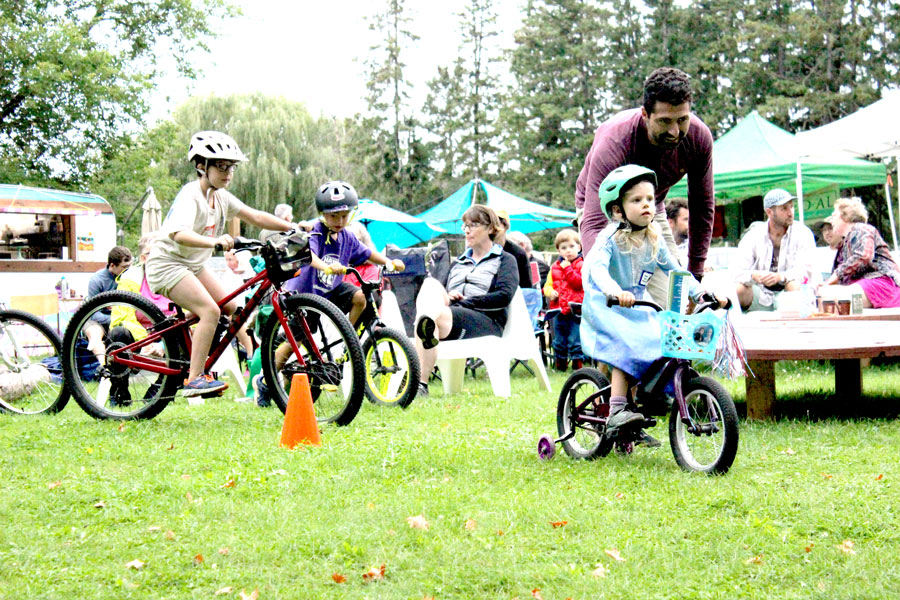CENTRE WELLINGTON – Thirty years ago, the Grand River and its tributaries were designated as Canadian Heritage Rivers, a designation that recognizes their cultural heritage and recreation value.
The Bikes and Blues Festival may not have been created to mark the milestone anniversary of this designation, but the bike rides that are an essential part of the festival will certainly celebrate that heritage.
“These bike rides can tell the story of that heritage,” said festival co-founder Dustin Garrick, describing the Grand River as a place with a density of archeological sites comparable to the Mississippi River.
The festival, which takes place on Aug. 24 from 10am to 5pm, is only in its second year. Last year’s event was held in Belwood. This year, it has moved to the Wellington County Museum and Archives, where there will be live music, arts, wellness and children’s activities, as well as food and drink available, throughout the day.
But it’s the bike rides that will take people away from the museum – on local trails, over and alongside local waterways – that are central to the festival.
Garrick, a professor at the University of Waterloo who studies water and community development, and his partner, Heather Garrick, are the founders of Water Cycles, the organization behind the festival.
“The mission of the organization is to reconnect people and water through cycling,” he explained.
The fledgling organization plans “water cycle” events, which Garrick defines as “a bike ride that tells a story about water.”
The aim is to raise awareness of water issues, locally and worldwide, by using bikes to bring people closer to water. Garrick is eventually hoping to add a citizen-science component to the rides, where cyclists could contribute to data collection for research.
But for now, the rides and the festival that Garrick aims to turn into Water Cycle’s flagship event, are about raising awareness.
Garrick said he has worked all around the world, including in places that are dealing with issues of water scarcity.
In his travels he noticed “there were a lot of people who were able to learn about water issues just because they were passionate about cycling,” he said.
The organization is also engaged in fundraising, and the festival will be part of this drive.
One goal is to expand access to bikes to under-served communities.
“Despite there being two billion bikes in the world, they’re not evenly distributed,” explained Garrick.
That is both here and in developing countries, where access to a bike can mean improved access to things like clean water and schools.
There have been Water Cycles rides in places such as California and Kenya, highlighting different issues related to water, but Garrick knew he also wanted to create something in the upper Grand, the area that he now calls home.
“It’s a really special place,” he said. “I’ve biked around the world, and I think it’s world class.”
Last year, about 100 people took part in rides that highlighted the cultural and natural heritage of the upper Grand River, and the festival raised money to create an interactive game that was shared with kids at the Waterloo-Wellington Children’s Groundwater Festival in June of this year.
This is part of achieving the organization’s mission of increasing education and awareness about water, Garrick said.
He likens the cycling excursions to sneaking veggies into the mac and cheese. It’s a way to teach people about water while they’re enjoying their bike ride.
“Experience is what imprints on people, rather than what they learn in the classroom,” Garrick said.
This year’s rides include a family-friendly 10km loop along the Elora Cataract Trail; a longer ride of over 30km that takes in parts of the Grand and the Irvine Creek, with a snack stop at the Shand Dam; and a 90 to 100km ride that will follow gravel roads through Grand Valley to the Luther Marsh conservation area.
“We’ve chosen the routes on those roads so they will be more comfortable for a wide range of cyclists,” said Garrick.
The music portion of the festival gets underway at 2pm back at the Wellington County museum, with performances by Tragedy Ann, Kristine Schmitt and Andrew Penner.
Garrick said he hopes the location will be central enough to attract attendees from surrounding communities. Fergus and Elora are also important locations when it comes to water, he said. He added he hopes to continue hosting the festival in the same location going forward.
Museum programming supervisor Emily Peters said the county was excited when the Garricks inquired about a partnership to host the festival.
“It seemed like a natural partnership,” she said, noting it’s an event that “incorporates fun education that appeals to all ages.”
The festival fits well with the county’s mandate to promote education about our natural resources, Peters said. “We’re really excited and looking forward to this event.”
For more information, tickets or to register, visit watercycles.bike/bike-and-blues-festival.



